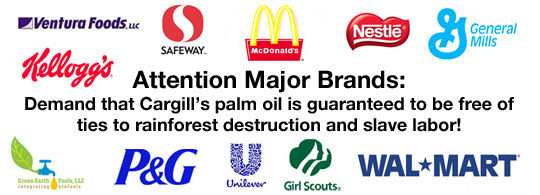“Whether we like it or not it is very largely our industry which is providing the economic incentives for individuals and companies to chop down trees… Between us, we spend billions of dollars buying these commodities. We can make a difference if we buy them differently and better.” – A senior Unilever executive in a speech to the Consumer Goods Forum to persuade the 300 Forum members to work together to end deforestation
While it is without question significant that Cargill just publicly committed to supplying Roundtable on Sustainable Palm Oil (RSPO)-certified palm oil to all of its customers around the world by 2020, the announcement doesn’t mean that Cargill’s customers should stop pushing Cargill to deliver responsibly sourced palm oil as soon as possible.
Cargill is not off the hook just yet, so Cargill customers — it’s not time to wipe that sweat from your brow.

General Mills, Girl Scouts USA, Kellogg’s, Safeway, Wal-Mart, Proctor & Gamble, Nestle, Unilever, Ventura Foods, McDonald’s and Green Earth Fuels, to name a few: your palm oil purchasing expectations still aren’t being met by Cargill. Cargill has not yet put in place the palm oil supply chain safeguard requirements that leading corporations are demanding.
Why does this matter? These popular brand names are still at risk as long as Cargill can’t assure its customers that its palm oil is not tainted with ties to rainforest destruction and/or slave labor.
For companies that already have a palm oil policy in place and/or agree that Cargill’s tacit commitments aren’t enough to protect their consumer brands from the heated controversy associated with palm oil, here are a couple of things you can do:
- Demand that Cargill adopt basic supply chain safeguards. Reason: Until RSPO certification takes into account greenhouse gas emissions and can assure the respect of native land rights and elimination of slave labor, we recommend you push Cargill to adopt push Cargill to adopt key environmental, social and transparency safeguards for its global supply chain.
- Demand that Cargill go beyond mass balance and provide fully segregated palm oil for all your supply chains. Reason: Mass balance refers to a system that allows for mixing certified, fully segregated palm oil with non-certified oil at any stage of the supply chain. This system supports the production of RSPO-certified palm oil but does not ensure customers like you that the palm oil you’re purchasing is not driving up demand for palm oil that is connected to rainforest destruction and human rights violations. Demand that Cargill improves the palm oil industry by moving quickly to fully segregated palm oil, which essentially means that you would be able to trace the palm oil you buy back to responsible sources.
- Demand RSPO Plus. Reason: In addressing the severe problems with the current palm oil industry, Cargill is putting all its eggs in one basket, the RSPO. Unfortunately, that basket is riddled with holes. RSPO standards are weak in a number of areas. As an example, RSPO certification in its current form does nothing to address and reduce climate change impacts from palm oil production, particularly on peat lands, which science tells us is contributing to record greenhouse gas emissions. RSPO Plus means starting with RSPO Certification and putting in place the additional environmental, social and transparency safeguards needed for a credible certification standard that will eliminate controversy in your supply chain.
- Push Cargill to accelerate implementation of its certified oil commitments. Reason: Action is needed now to ensure that critical forests and endangered species habitat is not lost before Cargill’s 2015 and 2020 commitments take effect. Palm oil is a leading cause of Indonesia’s deforestation, greenhouse gas emissions, and loss of critical orangutan habitat. The next five years are crucial. The sad reality is that the world can’t wait until 2015, let alone 2020, for greater corporate leadership.
If you’re a U.S. company with palm oil in your supply chain, it’s now quite clear that action is needed urgently. The importance of ensuring an ethical supply chain is growing by the day as companies are becoming increasingly vulnerable to internal and external scrutiny from customers, NGOs, and even CEOs risking brand damage and profits. Cargill won’t make bold moves unless you, as its customers, demand it.